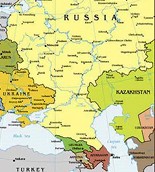Curing Homosexuality in Russia and Ukraine

(Bloomberg – bloomberg.com – Leonid Bershidsky – Leonid Bershidsky, an editor and novelist, is Moscow and Kiev correspondent for World View – October 10, 2012) Forget gay marriage. In Russia and Ukraine, politicians are treating homosexuality like a curable addiction — and even a crime.
Last week, acting on a widespread popular belief that sexual orientation is a matter of indoctrination, the Ukrainian parliament gave its preliminary approval to a bill that makes “propaganda of homosexuality” a criminal offense, punishable by a fine of about $10,000 or as many as five years in prison. “The spread of homosexuality is a threat to national security because it propagates the HIV/AIDS epidemic, destroys the family and could lead to a demographic crisis,” the bill’s drafters wrote in an explanatory note. The danger, they reasoned, is great enough to justify a limitation on freedom of speech.
Absurd as the legislators’ logic may sound, it is deadly serious. “A kid walks along Khreshchatik [Kiev’s main street] and sees a same-sex couple imposing their relationship on him,” one of the bill’s drafters, Communist parliamentary deputy Yevgeny Tsarkov, told the newspaper Gazeta Kyivskaya. “That cannot be allowed. Children should be protected against such information.”
The vote for the bill, which received 289 votes out of 450 with the backing of the ruling Regions Party, roughly reflected Ukrainian public opinion. A recent poll by the research firm Socis suggested that 61 percent of Kyiv residents believe that promoting homosexuality should be punishable by prison. Only 11 percent opposed any kind of punishment. The situation is similar in Russia. In a poll by the All-Russian Center for the Study of Public Opinion, 86 percent of respondents supported a ban on “propaganda of homosexuality” among minors.
Although attempts to pass national anti-gay laws have so far failed in Russia, some regions and municipalities have taken matters into their own hands. The first local law banning the promotion of homosexuality was enacted in the city of Ryazan, east of Moscow, in 2006. The biggest victory for Russian homophobes came in March 2012, when St. Petersburg, Russia’s second city and President Vladimir Putin’s birthplace, passed an identical measure. In all, promoting a gay lifestyle is now illegal in 10 Russian regions.
Homosexuality “is best cured by fasting and prayer,” said Vitaly Milonov, the primary backer of the St. Petersburg law and a member of the ruling United Russia party, in a radio interview. “I do not know of a single case in the Russian Orthodox Church when sincere repentance of this sin could not cure a person.”
During discussion of the bill in the St. Petersburg legislature, some members accused Milonov of being too soft on gays. One, Yelena Babich, said propaganda of homosexuality should be punishable by a life sentence. In the end, legislators settled on a fine of up to $160,000.
So far, one person has been fined $160 for homosexual propaganda in St. Petersburg. Nikolai Alexeyev, a gay activist, picketed the city government with a sign quoting beloved Russian actress Faina Ranevskaya: “Homosexuality is not a perversion. Hockey on grass and ballet on ice are.” After a failed appeal in Russia, Alexeyev’s case is now in the European Court for Human Rights in Strasbourg.
Russia’s higher courts have so far upheld the anti-gay laws. Ruling on the ban of an LGBT rally in Arkhangelsk, the Supreme Court reasoned that “the ban on the propaganda of homosexuality does not impede the right to receive and spread general, neutral information concerning homosexuality or hold legal public gatherings, including debates on the social status of sexual minorities without imposing homosexual values on minors who are unable, due to their age, to assess this information independently and critically.”
Ukraine’s efforts to outdo Russia face one counterbalancing influence: Unlike Russia, Ukraine wants closer integration with the West, particularly with the European Union. The nation’s foreign ministry, well aware that medieval legislation could hamper relations, protested the anti-gay bill, saying it hopes legislators will “take into account Ukraine’s international obligations in the area of human rights, and minority rights in particular.”
Sadly, that’s not likely. Legislators who oppose the bill have come under heavy pressure. Deputy Irina Gerashchenko, who criticized the anti-gay legislation on national TV, says she has received threatening phone calls. “I don’t know what’s in these people’s heads,” she wrote on Facebook. “Their aggressive style has as little to do with Orthodox Christianity as I do with Sodom and Gomorrah.”
Gays in Russia and especially Ukraine are used to the general public’s ignorance and homophobic attitudes. In Kiev this year, nationalists and religious fanatics crushed an attempt to hold a gay pride parade, and the few activists who dared to participate were beaten. An “anti-gay parade” took place without any interference.
The laws being passed in Ukraine and Russia are not just anti-gay. They are part of broader efforts by both regimes to chip away at free speech, starting with areas where the general populace backs them, sometimes without thinking. Consider, for example, how Russians responded to a second question in the poll that found them vehemently opposed to “homosexual propaganda”: Have they ever come across such propaganda? No, they have not, said 92 percent of those polled.
©2012 BLOOMBERG L.P. ALL RIGHTS RESERVED; article also appeared at http://www.bloomberg.com/news/2012-10-10/-curing-homosexuality-in-russia-and-ukraine.html
